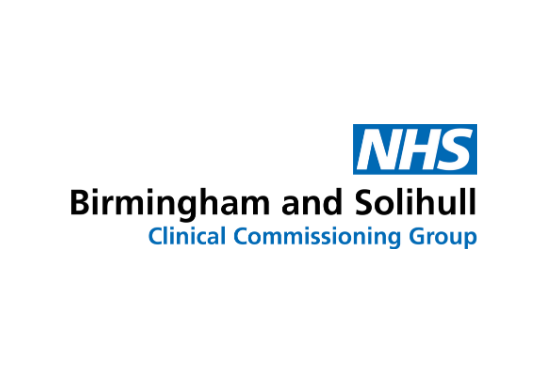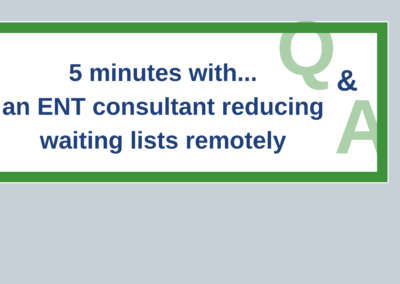‘Those who have used it have really been impressed with the advice and guidance that’s come through, and even more impressed that the consultants have phoned back days or two weeks later to check everything was all alright.’
Area Case Study: Community-provided Dermatology
NHS Birmingham and Solihull Integrated Care Board is one of the largest clinically-led commissioning organisations in England. It was officiated by NHS England on 1st April 2018, following a merger of NHS Birmingham Cross City CCG, NHS Birmingham South Central CCG and NHS Solihull CCG.
The ICB commissions health services for a population of 1.4 million, 170 different GP practices, and over 1,700 GPs (including trainees, registrars and locums).
We spoke to Pat Phillips, Senior Commissioning Manager – Planned Care, about the ICB’s innovative Teledermatology services which are now proving perfect for the sudden need for remote consultations.
Currently, GP and hospital dermatology clinicians are asking patients to take their own clinical photos and send these to their GP or hospital by email to a secure email system. To ensure patients take images that are of high quality, Consultant Connect has provided the CCG with a ‘‘guide to taking the best photographs for teledermatology – for patients’. GPs send this guide to patients by email before requesting that they take the photos required. These photos are then reviewed using the ICB’s innovative Teledermatology pathways which have been established for both Adults and Paediatrics.
Paediatric Dermatology – how the service started and why out-of-area paediatric resources are being used
With many clinicians retiring and dermatologists leaving the profession, the ICB was left with no choice but to close a local hospital Paediatric Dermatology service. They asked Consultant Connect to help provide a solution. Soon a pilot was set up to provide GPs in NHS Birmingham and Solihull ICB with out-of-area paediatric dermatology advice from Guy’s and St Thomas’ NHS Foundation Trust in South East London.
Pat says: ‘Guy’s & St Thomas’ have been amazing in what they’ve delivered for us. They answer their triage requests in minutes sometimes. It’s instant, and that was never known before. We had an over six-month waiting list in the children’s hospital for 1st outpatients, and hundreds of follow-ups that couldn’t be scheduled, so it was a really challenging situation.’
Pat adds: ‘It has been a bit challenging getting all our GPs onboard, but those who have used it, have really been impressed with the advice and guidance that’s come through, and even more impressed that the consultants have phoned back days or two weeks later to check everything was all alright. There have been examples of some of them having quite a long conversation across the evening about a very complex case, so they’ve really got involved with working with us.’
Performance
70% of all requests have been managed with Advice and Guidance being given back to the requester (avoiding unnecessary hospital visits), and that can be either a GP or the advanced nurse practitioners in the practice.
Adult Dermatology – how the service started and is expanding
‘Teledermatology started as a pilot project in one GP practice, two years ago, and in the Solihull area’ explains Pat. You can hear from some of the GPs at this practice – watch this short video.
The pilot has now become a successful service covering a population of 42,000 in a few different locations. Pat explains; ‘Instead of the requests going to a consultant in a hospital, they automatically come to our team of GPs with dermatology expertise – GPwSIs (GP with Special Interests). They are accredited with the Royal College of GPs, and we’ve also got nurse specialists working in that area as well.’
‘GPwSIs each have about 100 tasks sent each month, and which get triaged every day. So, they come in as a task and a teledermatology review on SystmOne. That enables the GPwSI to see all of the patient’s records, and the related images as well. This is an opportunity not only to review the images but also to go back to GP colleagues and talk to them about the images and the patient’s condition. It’s also an opportunity to provide some education and training to the GPs.’
Pat adds: ‘There are cases which do require some urgent attention, but with a combination of the GP with experience, and a consultant in the hospital talking together, they have been able to deal with those patients who the actual GPwSI thought should have gone into a secondary care service. We’ve now got a few more GPwSI / GPwER in Dermatology who can staff this service, and we’re rolling it out to a much larger population very soon.’
Performance
Pat shared some data (Pre-COVID) from the audits: ‘Our data shows for this Pilot Practice, there’s been a 57% reduction in dermatology routine referrals, and 43% reduction in two week waits.’ (This data is year on year comparison).
Useful Links




